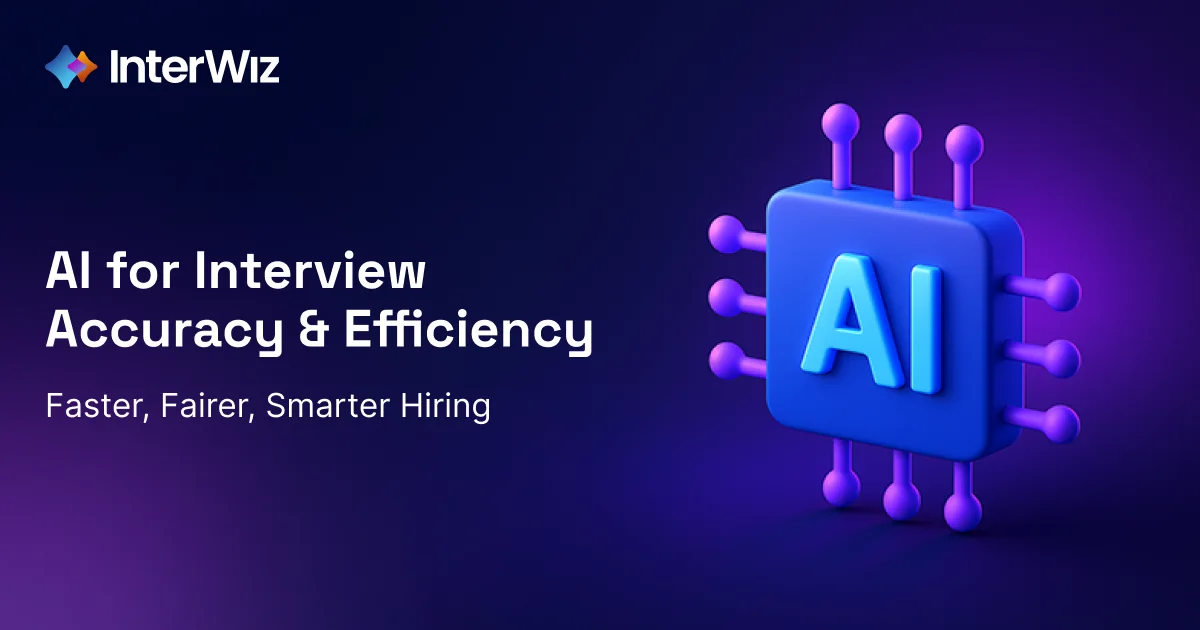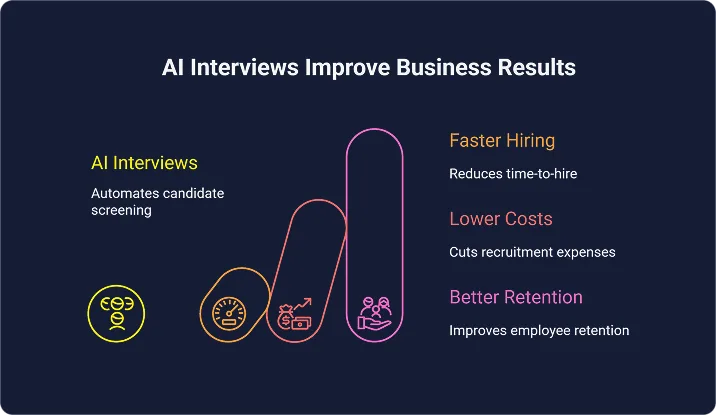AI-Led Interviews | Data-Driven Hiring
Why Companies Are Turning to AI for Interview Accuracy and Efficiency

Here's the reality: recruiters are drowning in applications while racing against shrinking timelines. You're managing more candidates than ever, yet traditional interviews drag on for 40+ days and burn through $4,700 per hire (SHRM). The math doesn't work.
That's exactly why 87% of companies have already moved to AI-powered hiring (Harvard Business Review). Smart organizations are cutting time-to-hire nearly in half (PwC, 2023) while eliminating the guesswork through standardized, data-driven assessments.
This isn't theoretical anymore. From Unilever's enterprise-scale transformation to GM's scheduling breakthrough, the results are measurable and immediate.
You'll discover the strategic advantages driving this shift, see real-world performance data, and learn how forward-thinking HR leaders are implementing AI responsibly to accelerate hiring without sacrificing quality.
Traditional Interviews vs. AI Interviews – The Core Comparison
Traditional interviews feel comfortable, but comfort isn't efficiency. You're stuck with scheduling nightmares, inconsistent evaluations, and hidden bias that blocks you from identifying top talent quickly. AI-powered interviews solve these problems by standardizing your process and scaling it across hundreds of candidates simultaneously.
Scheduling and Efficiency
Scheduling bottlenecks kill deals. Traditional coordination burns up to a week while your best candidates accept competing offers (LinkedIn Recruiting Trends, 2022). The data tells the story: General Motors slashed scheduling time from five days to 29 minutes using AI assistance (Paradox & GM Case Study, 2023). Speed wins talent.
Accuracy and Consistency
Human interviews create variables you can't control. Different questions, different scoring, different results. Research proves structured interviews predict job performance nearly twice as effectively as unstructured conversations (Journal of Applied Psychology, 2020). AI interviewing tools apply this structured approach universally, asking identical questions and analyzing responses against consistent criteria. You get comparable data, not subjective impressions.
Bias and Fairness
Unconscious bias derails even well-intentioned hiring decisions. SHRM data shows 79% of HR professionals struggle with bias in their processes (SHRM, 2022). AI systems, when built correctly, focus on candidate responses rather than demographics, appearance, or accent. Unilever's results speak clearly: AI-driven video interviews delivered 75% faster hiring cycles and measurably more diverse teams (Unilever Recruitment Report, 2021).
The Business Case for AI-Powered Interviews
The ROI isn't debatable anymore. Organizations implementing AI interviews are delivering faster cycles, lower costs, and stronger retention simultaneously.

Faster Hiring: AI-powered interviews cut time-to-hire by 40–50% (PwC). This isn't just about filling roles sooner—it's about capturing top talent before competitors do and maintaining productivity during transitions.
Lower Costs: At $4,700 per hire nationally (SHRM), recruitment expenses add up fast. AI automation eliminates manual screening hours and repetitive tasks, reducing cost-per-hire by 30–50% while freeing your team for strategic relationship-building.
Better Quality and Retention: Standardized evaluations ensure only your strongest candidates advance. Harvard Business Review data shows AI-screened candidates receive offers 14% more frequently. Better matches mean stronger performance and higher retention, eliminating the hidden costs of bad hires.
Bottom Line: AI interviews deliver measurable ROI through faster cycles, reduced expenses, and superior long-term hiring outcomes, results that traditional methods can't match at scale.
Case Studies of AI in Interviewing
The proof lives in real-world implementation. Here's how different organization types are transforming their hiring through AI-powered interviews.
Unilever: Enterprise-Scale Hiring
Managing one million annual applications makes traditional interviews impossible. Unilever's AI video interview implementation cut recruitment cycles from four months to four weeks while saving 100,000 recruiter hours annually (Unilever Report). The system deliberately ignored demographic markers like gender and university, creating measurably more diverse hiring outcomes.
Deel: Tackling Screening Fraud in Tech Hiring
Deel faced AI-assisted cheating on technical assessments. Their AI interview platform with integrated proctoring and real-time feedback boosted legitimate pass rates from 10% to 50% while cutting hiring costs by 80% (Deel Case Study). Recruiters now focus exclusively on qualified candidates instead of sorting through fraudulent applications.
Hilton and General Motors: High-Volume Recruiting
Volume hiring demands systematic solutions. Hilton deployed AI video interviews for hourly positions, reducing recruiter screening time by 75% (Hilton Report). General Motors' AI scheduling assistant cut coordination time from five days to 29 minutes while improving candidate attendance rates (Paradox & GM Case Study).
Strategic and Ethical Considerations for HR Leaders
Implementing AI interviews requires strategic thinking beyond efficiency gains. Focus on these three critical areas:
Candidate Experience: 83% of job seekers prefer on-demand interview flexibility (HBR, 2023), but hybrid models work best, AI for initial screening, humans for final rounds. This balances speed with personal connection.
Bias and Compliance: AI reduces bias through standardized questions, but algorithms need regular fairness audits (SHRM). Transparent communication ensures candidates understand human decision-makers remain in control.
Enterprise vs. SMB Adoption: Large organizations use AI to manage massive application volumes, while SMBs and staffing agencies leverage it to scale limited resources and redirect recruiters toward relationship-building activities.
How InterWiz Addresses Interview Efficiency and Accuracy Gaps
Most AI interview platforms leave critical gaps: generic assessments, limited feedback, and poor workflow integration. InterWiz was designed specifically to solve these problems, functioning as a true interview copilot that delivers automation with accuracy, customization, and actionable intelligence.
Efficiency Gains
InterWiz automates scheduling and initial screenings, reducing time-to-hire by up to 40% while freeing your recruiters to engage top candidates instead of managing repetitive administrative tasks.
Accuracy in Evaluation
Standardized questions and AI-powered response analysis improve hiring accuracy by up to 95% while reducing unconscious bias. Every candidate receives identical evaluation criteria.
Customizable Assessments
Role-specific evaluations matter. InterWiz enables custom assessments from soft skills and behavioral questions to technical coding and analytical challenges, aligning interviews directly with job requirements instead of generic screenings.
Actionable Insights
Comprehensive analytics deliver candidate rankings, complete transcripts, and instant feedback. Your recruiters gain deeper performance visibility, enabling faster, more confident decision-making.
Strategic Value: InterWiz transcends basic automation, delivering efficiency, accuracy, and transparency through a single platform. This makes it the trusted partner for HR leaders, staffing agencies, and tech hiring teams focused on scaling intelligent hiring decisions.
Bottom Line: AI for Interview Accuracy and Efficiency
AI-powered interviews have moved from innovation to necessity. Organizations that want reduced hiring costs, accelerated decisions, and fairer evaluation processes can't rely on traditional methods anymore. AI interview platforms like InterWiz provide the optimal balance of automation, accuracy, and human oversight. The outcome: faster hiring cycles, stronger candidate advancement, and recruiters empowered to make smarter, data-driven decisions.
FAQs about AI for Interviews
Does AI replace human interviewers?
No. AI functions as an interview copilot, automating scheduling, screening, and initial evaluation. Final hiring decisions remain with recruiters and hiring managers.
How accurate are AI interview tools?
Research demonstrates AI scoring predicts job performance more accurately than unstructured human interviews (MIT Sloan, 2022). Platforms like InterWiz use standardized assessments to further enhance consistency and reduce bias.
Will candidates find AI interviews impersonal?
Most job seekers value on-demand interview flexibility and instant feedback (HBR, 2023). For senior or high-stakes positions, combining AI screening with live human interviews delivers optimal candidate experience.
How does AI ensure fairness?
AI asks identical questions and analyzes responses against predetermined criteria, reducing unconscious bias. Platforms like InterWiz support bias audits and customizable assessments to maintain fair evaluation processes.
Can smaller teams or agencies benefit from AI interviews?
Absolutely. SMBs and staffing agencies often see the largest gains because AI enables lean recruiting teams to scale hiring efficiently without additional headcount requirements.

High Quality Screening with AI Interviews
Automated interviews built for speed, scale, and accuracy.
🔥 Full features, no credit card required.